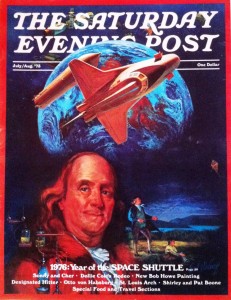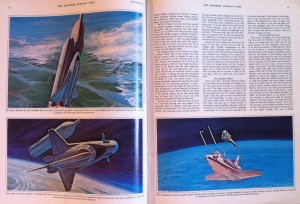On Saturday, I managed ten minutes of shopping at the local antique mall before getting sick. Luckily, they were ten very productive minutes. In the first booth I stopped at (okay, at which I stopped), I found two bits of space history: a 1976 edition of The Saturday Evening Post with an article promoting the Shuttle program and a 1969 issue of LIFE magazine with an article following up on the first lunar landing.
I planned to scan the articles but soon realized I’d have to break the spines to get the magazines to lie flat on the scanner bed. The article on the Space Shuttle is particularly intriguing, so I may transcribe it at a later date. The illustrations capture the essence of the Shuttle program—the solid rocket boosters, external tank, Canadarm, are all there—yet everything looks just slightly off.
The most interesting part of the LIFE article is the appended editorial agitating for “a sensible post-Apollo 11 program.” The unnamed author argues that Nixon should decline to sign “the sort of blank check for an all-out manned Mars landing that vocal space agency partisans are urging on him.” Rather than set our sights on Mars, we should focus on higher priorities: completion of the Apollo program; unmanned probes in space; development of new scientific earth satellites; and a manned orbiting laboratory. The completion of these projects “would gather basic scientific knowledge of space. Our main business now should be to consolidate Apollo 11’s ‘giant leap for mankind’ by harvesting and adding to the knowledge it has unlocked. This goal is consistent with a reasonable NASA budget, and with the existing challenge set by John Kennedy: to learn “to sail on this new ocean.” (p. 30)
I’m guessing that LIFE‘s call for a “reasonable NASA budget” has something to do with U.S. military expenditures in 1969.[1] However, that would mean the editorial board didn’t consider the military potential for those “new scientific earth satellites.” Or, it could be that they understood the military applications of a satellite quite well, but hoped to either squelch the program with a reduction of funding or slide it by the reading public in the guise of “seeking scientific knowledge.” I’m just speculating, of course, but the editorial seems rather lukewarm about the space program, given that only two months had passed since the first lunar landing.
————————
[1] See the United States Arms Control and Disarmament Agency’s report World Military Expenditures 1969 for some shocking figures on North American military spending in the 1960s.


